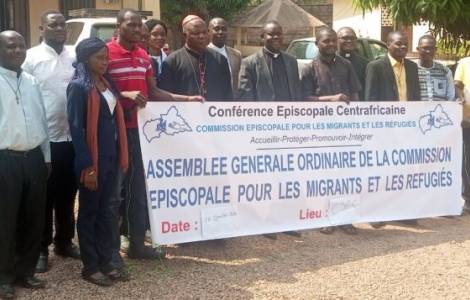
Bangui (Agenzia Fides) - The Central African Republic is both a country that welcomes refugees and an area from which its inhabitants flee to seek their fortune in neighboring countries. This is because several Central African areas are characterized by instability caused by guerrilla groups or criminal gangs or by foreign mercenaries (see Fides 23/1/2024). But the neighboring countries of Central Africa are also in a precarious situation, such as Sudan, South Sudan and Chad. Meanwhile, after several years, more than six hundred thousand Central Africans are waiting to return to their country thanks to the repatriation program coordinated by the United Nations High Commissioner for Refugees (UNHCR) in collaboration with the government in Bangui. The program was launched seven years ago and provides for the gradual repatriation of Central African refugees living in the Republic of Congo, the Democratic Republic of Congo, Chad and Cameroon in 2024. The Central African government must be supported in the development of basic social infrastructure such as schools, health centers and wells in order to offer the returnees decent living conditions. To do this, "we need everyone’s help. The financial institutions, for example the African Development Bank, which is ready to support the return; "the Central African state must direct its own development towards these areas in order to be able to accommodate these people," says Olivier Fafa, representative of the UNHCR in Central Africa.
At the same time, UNHCR and the Central African government are committed to providing lasting help to refugees, asylum seekers, internally displaced persons and returnees welcomed into the country. UNHCR wants to ensure that refugees are productive within the host community and participate in the economic life of the Central African Republic by distributing seeds and agricultural tools. Thousands of refugees have sought asylum in the Central African Republic, especially Sudanese and Chadians. "What we do for these people is to guarantee them freedom of movement in terms of protection and documents. In addition to protection assistance, we provide household items, water, shelter and sanitation," explains the UNHCR. The Catholic Church also offers support to migrants, refugees, displaced persons and victims of human trafficking through the Bishops' Commission for Refugees and Migrants. "The Church must be close to migrants and refugees. Many people leave this country, sometimes not because they choose to, but because they are forced to, and the Church, as a mother, cannot be hostile to these brothers and sisters," says Cardinal Dieudonné Nzapalinga, Archbishop of Bangui and head of the Commission. In 2023, thanks to funding from the International Catholic Commission for Migrants, the Commission supported at least 542 people through projects for children's schooling, therapeutic nutrition assistance for malnourished children, the organization of mental health training workshops and psychosocial support in Bangui, Boda, Bossangoa and Bouar. (L.M.) (Agenzia Fides, 24/1/2024)